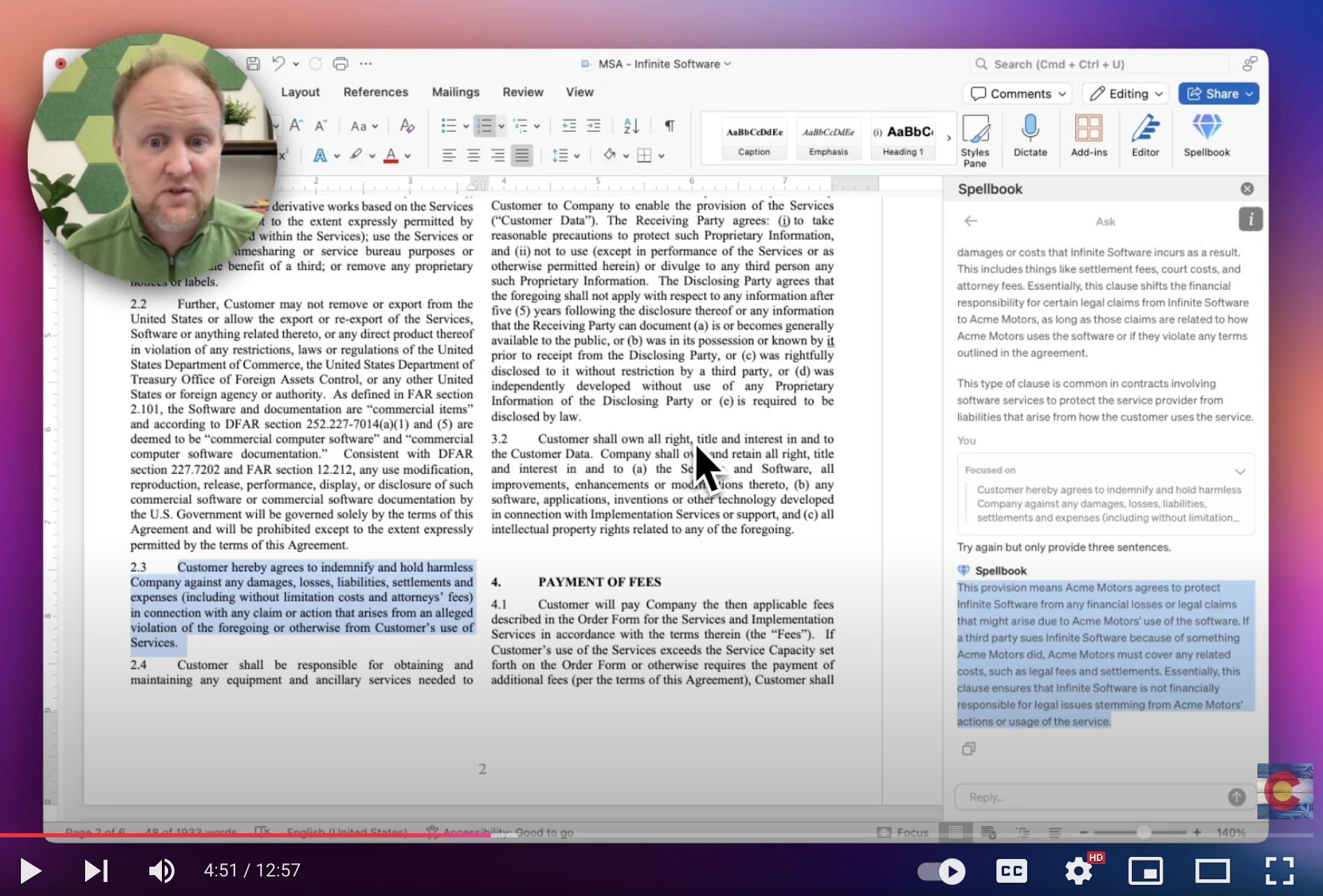AI has found its way into nearly every industry, and the law is no exception. For me, as an entrepreneurship attorney based in Boulder, Colorado, AI tools like ChatGPT and Spellbook (a Microsoft Word plugin for lawyers) are much more than just time savers—they make me a better lawyer. The ability to work smarter and more accurately is changing the way I approach my practice. It’s not about cutting corners or automating legal advice; it’s about expanding capabilities, enhancing precision, and improving communication.
In this article, I’d like to share how I’m using AI, including a video showcasing some of my recent use cases for AI in law. Before diving in, I’d like to highlight two important points: First, I’m a paid advisor to Spellbook. Second, I never upload client data to ChatGPT (and in most cases, you shouldn’t either).
Beyond Time Savings: AI as a Skill Enhancer
Many people think of AI as a tool primarily for saving time. While that’s certainly true, it’s not the primary benefit for me. My main reason for using AI is to be a better lawyer. AI helps me double-check my work for errors, and I don’t just mean grammatical issues. I’m talking about more serious errors, such as dates that don’t align, contractual sections that contradict one another, or provisions that need refinement.
In the context of the practice of law, those errors matter more than anything. They can jeopardize transactions or lead to disputes, costing my clients time and money. AI acts as my second pair of eyes, which is invaluable to me—especially as a solo attorney.
Expanding Scope and Jurisdiction
As an attorney, I frequently face questions that span different jurisdictions and deal with various types of agreements.
For example, a Colorado-based client recently asked that I draft an employment agreement for an employee in a state whose employment laws I hadn’t previously researched. I quickly drafted the kind of agreement I’d create for a Colorado-based employee, and then I used ChatGPT and Spellbook to research what unique laws that other state may have that would require modifications to the agreement.
Within seconds, it told me about specific time off laws, compensation laws, and other laws that I needed to consider. I never rely solely on the AI’s output – I always double check, which means that I initially ask the AI for its sources – and then I make sure to check them. And sure enough, after double checking the appropriate government agency websites, I found the information 100% accurate and I updated the agreement accordingly.
Moreover, I can broaden my capabilities with AI.
For example, a client asked that I review small scale architecture agreement they wanted to sign. I’ve seen these before, but not often because I don’t routinely practice construction law. I navigated 90% of the agreement just fine on my own. However, there were several provisions that allocated too much risk to my client. I knew it went too far, and I had a general idea of a better middle ground, but I wasn’t immediately sure the best way to approach the negotiation.
I asked Spellbook, which promptly gave me recommended redlines, along with context I could send the other attorney as to why we wanted the modifications. Using my professional judgment, I agreed with the redlines and context, so I sent it to the architect’s attorney. He replied ten minutes later approving all my requests.
Writing Better: Communication Matters
Beyond expanding my knowledge base and checking my work, AI also helps me communicate more effectively with my clients and other attorneys.
For example, when I draft an extremely complex provision, I will often spend a great deal of time refining it for clarity, while trying to maintain the legal accuracy. Now, when I run into such situations, I simply ask the AI tools to refine the provision for me. Within seconds, the tool provides simpler, more digestible language without compromising on the nuance or precision. Clearer communication means more informed clients, better decision-making, and ultimately, more successful outcomes.
Confidence Boost: Fighting Imposter Syndrome
Another unexpected benefit of AI is its ability to provide assurance – something I think many lawyers worry about, but don’t talk about. Practicing law, particularly as a solo attorney, can be isolating. Unlike firms with dozens, or even hundreds, of attorneys, I don’t have immediate access to colleagues to bounce ideas off of or validate my decisions. Imposter syndrome can easily creep in, and when that happens, it can affect confidence.
Using AI tools like Spellbook and ChatGPT helps alleviate some of that doubt. Whether it’s double-checking my analysis, clarifying unfamiliar contractual language, or suggesting improvements to my writing, AI is there as a silent but effective partner. It’s reinforcing my ability to deliver better advice to my clients.
Showcasing AI
To help illustrate how powerful AI can be for transactional attorneys, check out this video I made that showcases some of these examples:
Moving Forward with AI
For me, AI is here to stay, and the benefits of using it far outweigh the risks. While I understand the need for caution, I also believe in pushing forward. AI helps me do more, do better, and serve my clients with a level of confidence and accuracy that wasn’t as easily achievable before.
This is how AI is revolutionizing not just legal practice broadly, but my own practice, every day.










